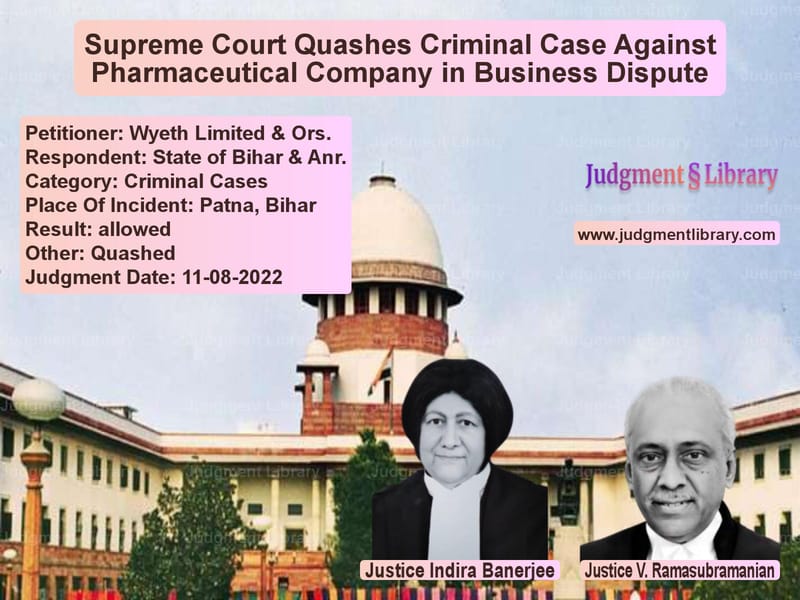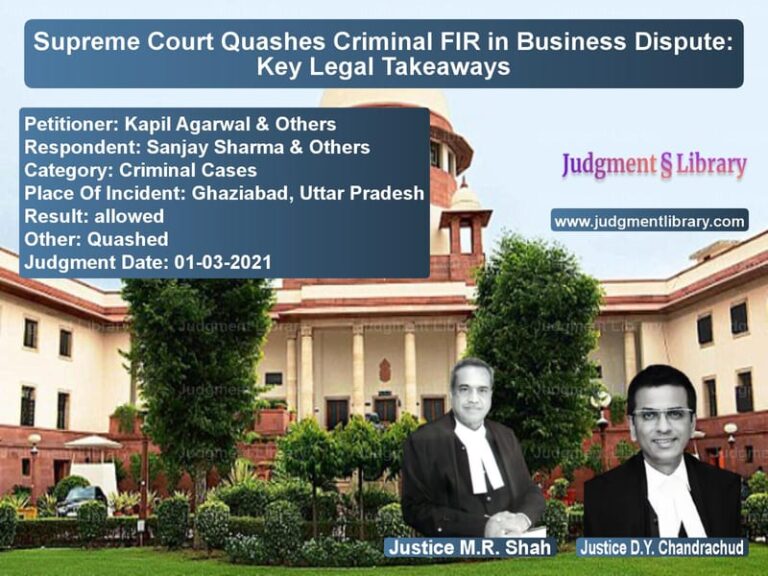Supreme Court Quashes Criminal Case Against Pharmaceutical Company in Business Dispute
The Supreme Court has quashed a criminal case against Wyeth Limited and its executives, ruling that the complaint was merely a retaliatory move in a commercial dispute. The judgment reinforces that criminal proceedings should not be misused for settling civil and contractual disagreements.
Background of the Case
The case involved a dispute between Wyeth Limited, a pharmaceutical company, and its former Carrying and Forwarding (C&F) agent in Bihar. Wyeth had engaged the respondent as its C&F agent on a contractual basis. The agreement was periodically renewed until February 2012, after which disputes arose.
Wyeth Limited filed a civil suit in the Bombay High Court (CS No.1432 of 2012) seeking to recover goods and payments due from the respondent. The court appointed a receiver who took possession of certain goods belonging to Wyeth from the respondent’s premises.
In addition to the civil suit, Wyeth also lodged a criminal complaint against the respondent, alleging misappropriation of goods and breach of trust under Sections 406 and 420 of the Indian Penal Code (IPC). The Chief Judicial Magistrate (CJM) in Patna took cognizance of the complaint on August 14, 2013, and issued summons to the respondent.
Subsequently, the respondent countered by filing a criminal complaint against Wyeth Limited and its executives. Based on this complaint, the CJM directed the registration of an FIR against Wyeth and its officials under multiple IPC sections, including 406, 420, 408, 460, 471, 384, 311, 193, 196, and 120B.
Wyeth Limited approached the Patna High Court under Section 482 of the Criminal Procedure Code (CrPC), seeking quashing of the FIR. However, the High Court dismissed the petition in 2018, citing procedural grounds.
Arguments Before the Supreme Court
Petitioners’ Arguments (Wyeth Limited & Executives)
- The petitioners argued that the complaint was a retaliatory move, filed only after Wyeth had initiated civil and criminal proceedings against the respondent.
- They contended that the allegations in the respondent’s complaint did not disclose any cognizable offense.
- They highlighted that the entire dispute was contractual in nature, and the respondent was attempting to give it a criminal color to pressurize Wyeth.
- They emphasized that criminal proceedings cannot be used as a means to settle commercial disputes.
Respondent’s Arguments (Former C&F Agent)
- The respondent argued that Wyeth Limited had wrongfully terminated their contract and forcibly took possession of goods.
- They alleged that the actions of Wyeth amounted to criminal breach of trust and misappropriation of property.
- They contended that their complaint contained enough material to warrant a police investigation and trial.
- They further submitted that the High Court was correct in refusing to quash the FIR.
Supreme Court’s Observations
The Supreme Court carefully examined the facts and found that the criminal complaint filed by the respondent was an afterthought. The Court noted:
“A dispute arising from a contractual relationship, where civil remedies are available, should not be converted into a criminal proceeding merely to exert pressure on the other party.”
It further observed:
“Even if all the allegations in the complaint are taken at face value, they do not make out any cognizable offense. The dispute is purely civil in nature, and criminal law should not be misused for private vendetta.”
Additionally, the Court pointed out that Wyeth had filed its civil suit and criminal complaint first, indicating that the respondent’s complaint was retaliatory in nature.
Supreme Court’s Verdict
The Supreme Court allowed the appeal and passed the following orders:
- The High Court’s order dismissing Wyeth’s quashing petition is set aside.
- The FIR and charge-sheet filed against Wyeth Limited and its executives are quashed.
- The Supreme Court reiterated that criminal law should not be misused to settle commercial disputes.
- Both parties were directed to resolve their remaining claims through civil litigation.
Impact of the Judgment
This ruling has significant implications for business disputes:
- It establishes that commercial disputes should be resolved through civil remedies rather than criminal prosecution.
- It prevents the misuse of criminal law for exerting pressure in business conflicts.
- It reinforces that courts must carefully examine whether criminal complaints have a genuine basis before allowing prosecution.
- It safeguards corporate executives from frivolous criminal cases arising from contractual disputes.
The judgment serves as a strong precedent against the criminalization of business disagreements and upholds the principle that commercial disputes should be settled through appropriate civil mechanisms.
Petitioner Name: Wyeth Limited & Ors..Respondent Name: State of Bihar & Anr..Judgment By: Justice Indira Banerjee, Justice V. Ramasubramanian.Place Of Incident: Patna, Bihar.Judgment Date: 11-08-2022.
Don’t miss out on the full details! Download the complete judgment in PDF format below and gain valuable insights instantly!
Download Judgment: wyeth-limited-&-ors.-vs-state-of-bihar-&-anr-supreme-court-of-india-judgment-dated-11-08-2022.pdf
Directly Download Judgment: Directly download this Judgment
See all petitions in Fraud and Forgery
See all petitions in Contract Disputes
See all petitions in Judgment by Indira Banerjee
See all petitions in Judgment by V. Ramasubramanian
See all petitions in allowed
See all petitions in Quashed
See all petitions in supreme court of India judgments August 2022
See all petitions in 2022 judgments
See all posts in Criminal Cases Category
See all allowed petitions in Criminal Cases Category
See all Dismissed petitions in Criminal Cases Category
See all partially allowed petitions in Criminal Cases Category







